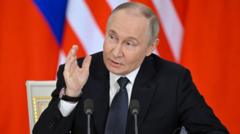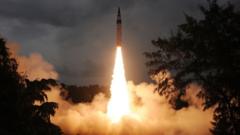Despite repeated clashes, the strategic dilemma between these nations remains unresolved, impeding India's ambitions on the global stage.
**Confronting Conflict: India and Pakistan's Stalemate Persisting through Time**

**Confronting Conflict: India and Pakistan's Stalemate Persisting through Time**
This article examines India and Pakistan's enduring military conflict and its implications for their future relations.
The recent military confrontation between India and Pakistan, marked by artillery shelling in areas like Poonch, serves as a stark reminder of the protracted conflict that has spanned nearly eight decades. Indian forces engaged in their most extensive military activity against Pakistan in half a century, inflicting damage to strategic installations yet yielding little in the way of a decisive military victory.
The clashes unfolded over four days, revealing not just the daunting capabilities of both nations but also the complex geopolitical context. Despite India's military strength, the lack of a clear resolution exposes the country's vulnerabilities, as it grapples with the ongoing narrative that equates its ambitions with those of its neighbor, often characterized by Western powers and Indian officials alike as a rogue state.
This recurrent cycle of military engagements underscores a pervasive sense of powerlessness within India. As officials such as former national security adviser Shivshankar Menon have noted, the ongoing hostilities are less about achieving a military solution and more about managing a conflict that has long been intertwined with Pakistan’s identity and strategic goals.
Interviews with various diplomats and analysts highlight the complexities inherent in the relationship, strained by decades of warfare and failed peace attempts. Each cycle of conflict only serves to deepen the divide, leaving a perpetual dilemma for Indian leadership who struggle to find a sustainable path forward in an environment where peace seems increasingly elusive.
As both nations navigate the treacherous waters of nuclear brinkmanship and regional stability, the question persists: How can India effectively confront the challenges posed by Pakistan and emerge as a credible global player? The answer remains clouded in uncertainty, as the history of the subcontinent continues to shape their turbulent relationship.
The clashes unfolded over four days, revealing not just the daunting capabilities of both nations but also the complex geopolitical context. Despite India's military strength, the lack of a clear resolution exposes the country's vulnerabilities, as it grapples with the ongoing narrative that equates its ambitions with those of its neighbor, often characterized by Western powers and Indian officials alike as a rogue state.
This recurrent cycle of military engagements underscores a pervasive sense of powerlessness within India. As officials such as former national security adviser Shivshankar Menon have noted, the ongoing hostilities are less about achieving a military solution and more about managing a conflict that has long been intertwined with Pakistan’s identity and strategic goals.
Interviews with various diplomats and analysts highlight the complexities inherent in the relationship, strained by decades of warfare and failed peace attempts. Each cycle of conflict only serves to deepen the divide, leaving a perpetual dilemma for Indian leadership who struggle to find a sustainable path forward in an environment where peace seems increasingly elusive.
As both nations navigate the treacherous waters of nuclear brinkmanship and regional stability, the question persists: How can India effectively confront the challenges posed by Pakistan and emerge as a credible global player? The answer remains clouded in uncertainty, as the history of the subcontinent continues to shape their turbulent relationship.























